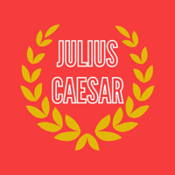
Overview
Synopsis
Based on true events in Roman history, Julius Caesar tells the story of the powerful ruler brought down by the betrayal of those he held dear.
Julius Caesar has just emerged victorious in a series of Roman civil wars and has become extremely popular with the populous. A fellow general, Cassius, organizes a group of conspirators -- including Caesar's close friend, Brutus -- to stop Caesar from becoming a tyrant. Meanwhile, Caesar ignores warnings from both a soothsayer and his wife, Calpurnia. The conspirators approach him with a fake petition so that they may crowd around Caesar, and then stab him to death. Caesar fights back at first, but when he sees Brutus takes his turn, Caesar gives in to his fate.
Shakespeare’s play not only features the events leading up to the assassination of Caesar, but also details the subsequent war and political turmoil that followed. This thrilling historical drama has been beloved by audiences for centuries, and contains many fantastic monologues for young actors interested in working with iambic pentameter!
Show Information
Context
Julius Caesar takes place in Rome during a time when the empire was in a precarious state: military leaders and senators were constantly competing with one another to be in control of the world’s greatest superpower. Julius Caesar emerged as Rome’s most popular politician and general, and managed to take control after winning great acclaim during his military career. Although he was by most standards a very good ruler, his absolute authority made many citizens nervous. Fearful of being
to read the context for Julius Caesar and to unlock other amazing theatre resources!Plot
Act One
The play opens with citizens of Rome celebrating the triumphant military leader, Julius Caesar. On the feast of Lupercal, a soothsayer addresses Caesar, warning him to “beware the ides of March,” meaning the fifteenth of March. He unfortunately ignores this.
Meanwhile, Brutus and Cassius speak privately. Brutus is a highly respected Roman and a leader in the community. Cassius is a citizen of Rome who is known for being very serious and well-read. Cassius attempts to convince
to read the plot for Julius Caesar and to unlock other amazing theatre resources!Characters
| Name | Part Size | Gender | Vocal Part |
|---|---|---|---|
|
Lead |
Male |
Spoken |
|
|
Lead |
Male |
Spoken |
|
|
Lead |
Male |
Spoken |
|
|
Lead |
Male |
Spoken |
|
|
Lead |
Male |
Spoken |
|
|
Supporting |
Male |
Spoken |
|
|
Supporting |
Female |
Spoken |
|
|
Supporting |
Female |
Spoken |
|
|
Supporting |
Male |
Spoken |
|
|
Supporting |
Male |
Spoken |
|
|
Supporting |
Male |
Spoken |
|
|
Supporting |
Male |
Spoken |
|
|
Supporting |
Male |
Spoken |
|
|
Supporting |
Male |
Spoken |
|
|
Featured |
Male |
Spoken |
|
|
Featured |
Either Gender |
|
|
|
Ensemble |
Either Gender |
|
Songs
A song with an asterisk (*) before the title indicates a dance number; a character listed in a song with an asterisk (*) by the character's name indicates that the character exclusively serves as a dancer in this song, which is sung by other characters.
Monologues
Scenes
Key Terms
A type of foundation makeup used as the first layer in stage cosmetics to even out skin tone.
Relating to the reign of Queen Elizabeth I, marked by flourishing English drama and playwrights like Shakespeare and Marlowe.
A literary device in which hints or clues are given about future plot developments, building suspense or dramatic irony.
A medieval and Renaissance symbol representing the unpredictable nature of fate. This term plays a vital role in understanding theatrical structure and is commonly encountered in stagecraft or performance settings.
The iconic London theatre associated with Shakespeare, where many of his plays premiered in the late 1500s and early 1600s.
A servant or deceitful man, often used in Shakespearean plays as a term of insult or social rank. This archetype is common in comedic and villainous roles in English Renaissance drama, revealing class tensions and dramatic contrasts.
An exclamation or mild oath in English Renaissance theatre, derived from 'by the Virgin Mary.' Used to express surprise or emphasis in period dialogue.
A Prophecy is a prediction or foretelling of future events, usually delivered by a character with divine insight or supernatural authority. In drama, prophecies often create dramatic tension by revealing the outcome before it happens. Characters may try to avoid the prophecy, but their actions usually bring it about, underscoring themes of fate and inevitability.
A speech delivered by a character alone on stage, revealing inner thoughts or emotions to the audience. Common in Shakespearean plays.
A Tragedy is a form of drama that explores human suffering, conflict, and loss, often leading to a disastrous or fatal conclusion. Traditionally, the main character experiences downfall due to a personal flaw, poor judgment, or forces beyond their control. Tragedy aims to evoke pity and fear in the audience, leading to reflection and emotional release.
A protagonist whose downfall results from a fatal flaw, central to classical and modern tragedy.
An old English word meaning 'why,' famously used in Shakespeare’s 'Romeo and Juliet' to express inquiry, not location.
Videos
Quizzes
Themes, Symbols & Motifs
Sorry! We do not currently have learning modules for this guide.
Quote Analysis
Sorry! We do not currently have learning modules for this guide.
